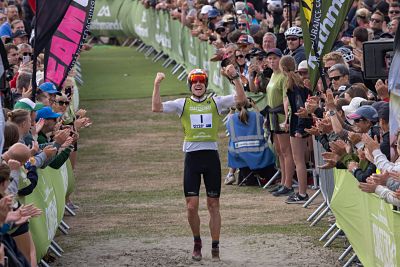Every training session and every race presents a unique opportunity. The purpose of an easy recovery run differs of course to that of a hard set of hill reps, but they each have their own benefit in the scheme of things. However, one good (or bad) workout doesn’t define our position in the sport. Multiple sessions across weeks and months do.
Consistency is really what matters. To be consistent we need to be healthy and we need to avoid serious injuries. It’s often underwhelming to see what a world class athlete does in a single training session. But they’re usually the most consistent, relentless and sustainable in their approach.
So, how do we know when quitting is the right decision? If consistency is important, when does it make sense NOT to continue?
When does it make sense to DNF?
I have faced this dilemma many times in my career, both in training and race scenarios. There have been many moments where the decision to continue poses a serious risk to my health and ability to achieve the goal of the task at hand. There have also been times where my health isn’t at stake, but the scales have still tipped away from continuation and I’ve pulled the pin. Sometimes I’ve felt proud and justified in quitting, other times I’ve felt embarrassed and regretful.
The moments where the idea of quitting has become increasingly complex have been in team racing environments. I’ve certainly pushed myself further and harder in team events than individual ones over the years. Nothing creates a greater sense of perseverance than the knowledge your teammates have invested time, money and resources into the common goal of finishing the event. My teammates and I have experienced varying states of heat illness, food poisoning, chronic blistering and fatigue-induced delirium, yet still pushed on.
One of the more haunting episodes in my career involved racing in extreme heat during a team event in China and running out of fluids hours before we reached the finish line. I have vague memories of running through sweltering valleys and mountains in a barely conscious state, partly knowing how dangerous the situation was but also knowing the need to continue in order to get the job done was non-negotiable.
When we crossed the finish line in first place we were in no state to celebrate. Instead, we were diving head first into buckets of cool water and drinking every bottle of water, cola and juice we could see, as well as being monitored by medical personnel as we recovered in the fetal position in the shade.
It would later transpire that one of our Kiwi friends in another team had been taken off the course in an ambulance and was fighting for his life. He would spend a number of days in an induced coma and many weeks in hospital after suffering life-threatening heat stroke. These are the risks we might take to achieve something as relatively insignificant as a race result.

The great internal debate: quitting vs. carrying on
With many years of experience under my belt, I’m now making better judgements than I used to. However, I’m still just as competitive and driven to succeed as ever and so the internal debates continue and likely will do so for the rest of my career in endurance sport.
When consistency is so important to success, quitting a session or a race is downright counterintuitive. However, it’s the pursuit of consistency that also helps qualify the decision to quit.
You see, when quitting a session today might mean continuing the training program tomorrow rather than needing a week to recover after pushing through a virus, a tight Achilles tendon or even a crappy night’s sleep, the decision holds greater validity. If race day isn’t going to plan and you know you won’t achieve what you had set out to, what’s the point in continuing? Are you better to live to fight another day?
I remember pulling out of IRONMAN New Zealand after a puncture left me well out of contention during the bike leg. As I rode towards the end of the ride, I knew the marathon was going to achieve nothing in the way of placings but further extend my recovery needs after the race. To me at that time it simply made no sense to continue and I climbed off my bike in transition, collected my belongings and walked back to my accommodation.
I remember some friends inviting me to coffee the following day to share stories of our collective race day experiences. I simply didn’t feel worthy and told them I couldn’t make it. There seemed to be a deep sense of failure, even though the decision still made sense to me.

Above all and to add complexity to the conundrum of quitting, I sense that a big part of my personal successes in endurance sport have surfaced through my ability to tough it out in situations that others might not. I feel proud when I reflect on the way I've trained and raced relentlessly for 15 years.
Even through times when quitting or pulling back on sessions would have made more sense. I set a high standard for myself and I have seen others quit when my interpretation of the situation has been that they shouldn’t have. We all invest so much in pursuit of our endurance goals, I never expect anyone to give up on those goals without a fight.
Where is your 'DNF line'?
I suppose that when I sit here in the comfort of my office chair and reflect into my keyboard, the decision to quit or carry on comes back to the unique purpose and opportunity that each session and race presents. The greater the opportunity, the more likely it is we will want to push further to achieve it.
If I feel sick and vomit during a training run, I’m calling my wife to come pick me up. If I feel sick and vomit in my goal race, I’ll see you at the finish line. It’s going to take a lot more to stop me when the stakes are high than when I know I can cross the session out and start again the next day.
Self-awareness plays a huge role here. Knowing where the line is and when it has been crossed. Experience has clarified to me where the line sits, but it still gets blurry when the competitive juices are flowing.
A big part of how I have looked back to interpret my decisions to quit or continue is by leaning on my trusted supporters. Typically, I’ve been very hard on myself if I quit and it always helps to talk it over with my coach and my wife in particular but also my physio (if it’s injury-related) and doctor.
We either succeed or we learn. So, to me the decisions we make will always coincide with an opportunity to learn. If we continue to learn and grow, we will always be benefiting from our time in the sport.
